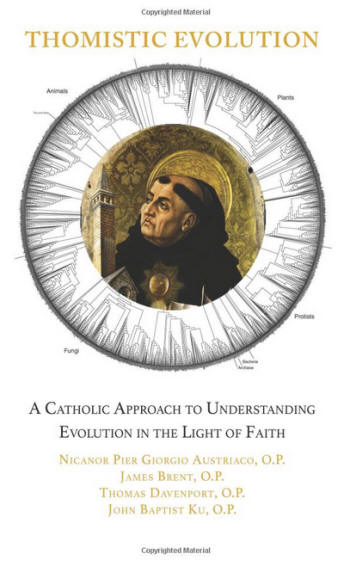Book Review
Thomistic Evolution:
A Catholic Approach To Understanding
Evolution In The Light Of Faith
Nicanor Austriaco, James Brent, Thomas Davenport, John Baptist KU
Cluny Media (1 April 2016)
ISBN: 978-1944418113
 While
I remain somewhat skeptical about evolution as a scientific theory, I
still found this work immensely thought provoking and intellectually
satisfying. It is written by a team of Dominicans and the Dominicans
appear to be among the good things in the Catholic Church today! The book
has much more than evolution to offer: in a relatively small work, we are
given a Thomistic understanding of reason, faith, causality, the existence
of God, the nature of creation, providence and the mystery of evil and
interpreting the first chapter of Genesis with Saint Thomas Aquinas.
While
I remain somewhat skeptical about evolution as a scientific theory, I
still found this work immensely thought provoking and intellectually
satisfying. It is written by a team of Dominicans and the Dominicans
appear to be among the good things in the Catholic Church today! The book
has much more than evolution to offer: in a relatively small work, we are
given a Thomistic understanding of reason, faith, causality, the existence
of God, the nature of creation, providence and the mystery of evil and
interpreting the first chapter of Genesis with Saint Thomas Aquinas.
The chapter on the four causes proved really helpful and easy to understand. The author explains that this classical understanding of causality is not the structure with which modern science generally approaches its work but it explains the being of things and it thus does not contradict science. Those who regard science as the only means of knowing will of course disagree.
Another helpful chapter is on the existence of God and it is an update of the famous five ways of Saint Thomas. We know that goodness and happiness are real even if we cannot define them. This is analogous to the way we know that God exists. The author goes on to note that nothing other than what we call God could be a good candidate for being that which is responsible for harmony and order in the world. As one might expect, an argument from contingency is also examined. Had Richard Dawkins read this chapter, he might not have made such a hash of his writings on Aquinas.
The chapter on the nature of creation reminds us that Aquinas does not hold a merely historical account creation but a metaphysical one. To be a creature is to be dependent on God for the very act of existence. In other words, God gives being to contingent things. This metaphysical dependence on God for being is primarily a present and vertical feature of things. How far removed we are from the philosophical notion of deism. And how far removed from scientism.
In the chapter on providence, it is said that God does not rely on creatures to execute his providential order because of any weakness on his part. Rather, he invites us creatures to cooperate with his providence because of the abundance of his goodness. He gives us the dignity of having a true role in the greater order of nature. In other words, he chooses to work through the secondary causality of created instruments. Because God transcends time, he is not surprised by the decisions we make. So, even though we are utterly dependent on God to act, we are still truly responsible for the results.
What about providence and the mystery of evil? The Church proclaims God's divine providence over all aspects of creation, without claiming to always understand how God's goodness ultimately triumphs over any particular evil, whether physical or moral.If there were no evil, much good will be prevented from existing: " A lion would cease to live if there were no slaying of animals, and there would be no patience of martyrs if there were no tyrannical persecution."
So, what we really have here is an entire course on the teachings of Saint Thomas. As such, it is of tremendous importance. The chapters are also well presented, with plenty of good examples.
Reviewed by Dr Pravin Thevathasan
